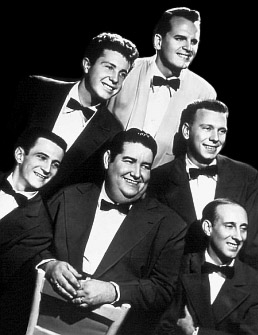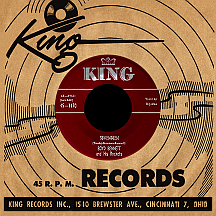BOYD BENNETT
AND HIS ROCKETS
Seventeen
The rock and roll acts of the late '40s and early '50s mostly came from either a rhythm and blues background or the world of country, meeting somewhere in the middle as the evolving, hybrid new musical style gained steam. Bill Haley set a precedent for some of the rock groups to come. Boyd Bennett of Muscle Shoals, Alabama, never got real comfortable with the C&W style Haley's Saddlemen established themselves with, but it served the purpose for awhile and comparisons to his band The Southlanders and Haley's outfit were inevitable. But that was before Bennett decided to target the teen audience.
When he was seven, Boyd's father bought him a guitar and taught him to play. His formative years were spent in Goodlettsville, Tennessee (just north of Nashville), during which time he learned bass, saxophone and drums and had a brief stint during his teen years performing with Nashville-based pianist and bandleader Francis Craig, who performed on WSM radio (home of The Grand Ole Opry) and, with vocalist Bob Lamm, would later have one of the biggest hits of the '40s, "Near You." Bennett graduated from high school in 1941 and served in the Navy during World War II; afterwards, he founded the Southlanders, playing country and western swing in small clubs around the south. In 1949 he had his own radio show on WSON in Henderson, Kentucky.
An audition for Columbia Records in 1951 didn't pan out, but soon afterwards he signed a deal with Syd Nathan's King Records of Cincinnati. "Time," his first single in early 1952, was a pure country ballad. "Waterloo," a late 1954 side penned by Bennett and John Young with a seldom-seen label credit to the Southlanders, had a pop arrangement with a touch of Dixieland. Boyd was the singer on these early efforts. Haley's Saddlemen had become The Comets a year earlier and Bennett followed suit; he and his band had appeared on local TV as Boyd Bennett and his Space Buddies (triggered somewhat by shows like the popular Captain Video series). Staying with the cosmic concept, Boyd Bennett and his Rockets became the billing on King singles starting in early '55.
Members around that time included bass fiddle player Kenny Cobb, saxophonist "Boots" Randolph (destined for success the following decade with his instrumental hit "Yakety Sax"), who was replaced at some point by Bobby Jones, short 'n' skinny guitarist Mickey "M.D." Allen and his reverse counterpart, 400-pound trumpeter James "Big Moe" Muzey. Other contributors were occasional pianist Jimmy McDaniels and guitarist Roy Ayres. The group sometimes backed King, Federal and DeLuxe label R&B acts like Earl Bostic, Bill Doggett and Otis Williams' group The Charms on studio sessions, fueling Boyd's decision to go full-on rock and roll. He stepped away from singing, leaving Big Moe to handle the majority of session vocals; his was the voice America heard on the band's biggest hits.
Live performances by this lineup were very well-received; during the mid-'50s, the Rockets did a regular Saturday night show at the Rustic dance hall and tavern (a large, barnlike building) on highway 231 in Jasper, Indiana (just over the Kentucky border about 200 miles north of Nashville), attracting youthful crowds of 1500 or more for each show. Two early 1955 singles, covers of R&B standards "You Upset Me Baby" (a recent hit for B.B. King) and "Boogie at Midnight" (Roy Brown's formative late-'40s rocker), weren't successful, and no wonder; while musically solid, Boyd's band reduced these trailblazing tracks to formulaic banality, little more than second-rate Comets imitations.

The reasonable thing was to compose original material that better reflected the sensibilities of rock and roll's rapidly-growing under-21 fan base. "Seventeen," written by Young and Bennett with Chuck Gorman, was patterned after Young's music-obsessed daughter (''...sloppy shirt, old blue jeans...dirty shoes, by all means...patch of blonde, peroxide hair...jukebox baby, ain't no square!'). Was she a 'hepcat doll,' as the lyrics suggest? Perhaps a little artistic license was taken. Compared to their previous two efforts, the song was a much better fit for the band's image and Big Moe's delivery, though Syd Nathan didn't agree and refused to release it. A&R man Henry Glover went behind his back and had the record released while Syd was out of town. It was the right move; the disc landed in the top 30 in early July (the same week Haley's culture-changing "Rock Around the Clock" spent its first of eight weeks at number one). Sales kicked in immediately; disc jockeys starting spinning "Seventeen" about a month later and it reached the top ten in August, just as a cover by The Fontane Sisters took its own top ten slot and a version by Rusty Draper slipped into the top 20. For Bennett and his collaborators it was a dream come true; their composition paid off on more than two million in combined sales.
To a certain segment of music fans, Haley and Bennett had come on the scene at the same time; this pair of just-turned-30 bandleaders even toured together that year. You already know who was better received. After the follow-up single, "Tennessee Rock and Roll," fell flat (too region-specific, perhaps?), Boyd and his Rockets had another hit, "My Boy - Flat Top," a "buddy-specific" male counterpart to "Seventeen" that faced stronger competition; an "adoring" female perspective by Your Hit Parade star Dorothy Collins reached the top 20 late in the year while the original managed one week in the top 40. Meanwhile, both of Bennett's hits faced formidable competition in the U.K. from versions by Frankie Vaughan, who built a long-term career covering U.S. hits.
Big Moe continued doing lead vocals as the band unleashed a string of non-hits, each sounding similar to its predecessor. Among the better efforts were a pair of singles by piano-pounding country honky-tonker Moon Mullican featuring backing by Boyd and the Rockets. The tempo and tone didn't change, but Moon's vocals gave an elevated energy to songs like "Seven Nights to Rock" and "Rock and Roll Mr. Bullfrog." A minor chart single came in the spring of 1956 with a cover of Carl Perkins' "Blue Suede Shoes" (Boyd singing lead this time) as the Rockets joined Elvis in diverting at least a little attention away from Carl's near-chart-topping classic. King issued several more discs by the group through early 1958, ending with two of their better efforts: "Move," written by and featuring a lead vocal by Cecil McNabb, Jr., and a simultaneous solo McNabb disc, "Clock Tickin' Rhythm," backed by Boyd's Rockets.
Boyd signed with Mercury Records, singing regularly and functioning more as a solo act with occasional backing by the "Boyd Bennett Chorus." Two notable singles came over a two-year run with the label: "Boogie Bear," a novelty takeoff on Hanna-Barbera's recently-created animated character Yogi Bear (in the fall of '59 it was his fourth and final record to reach the popularity charts) and an ultra-pop-sounding re-recording of "Seventeen" with vocals by R&R wannabe star Al Henderson and The Anita Kerr Singers. One final effort for King in 1963, "Hear Me Talking," took an unusual singing-and-talking approach unlike his previous work. Another single for Kernel Records of Louisville, Kentucky, "You and Me and Love," revealed a pop ballad side. Afterwards, he followed business interests in nightclub and TV station ownership and later started a lucrative company that manufactured parts for air conditioners. Boyd Bennett spent his retirement years in Dallas, Texas and passed away in 2002.


